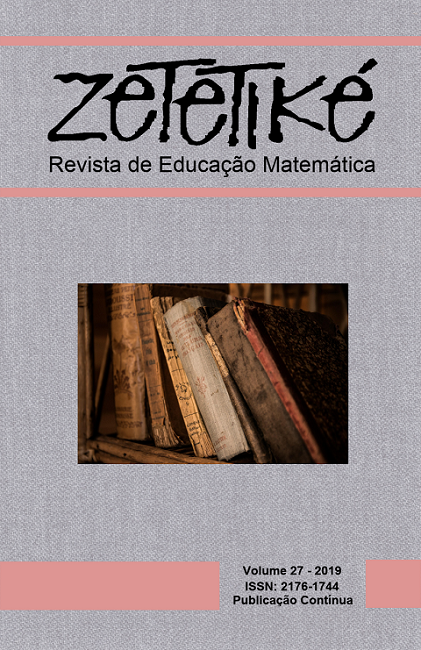Resumo
Neste artigo analisamos a prática de dois professores do 3.º ano, Carla e Ricardo, para compreender como se caracterizam as suas ações no que respeita à forma como exploram uma tarefa na sala de aula, às maneiras como questionam os alunos e as representações que os docentes privilegiam no decorrer do trabalho. Os dados foram recolhidos por observação participante suportada por gravação áudio e vídeo, sendo analisados através da análise de conteúdo. Os resultados indicam que a ação de informar surge mais frequentemente e está associada a perguntas de focalização retórica e/ou de confirmação fechada, enquanto a ação de desafiar, menos comum, está associada ao questionamento através de perguntas de inquirição. Com o intuito de promover a utilização das representações por parte dos alunos, os professores adaptam as suas ações e o tipo de questionamento que utilizam de forma a promover (i) a utilização e transformação da representação escolhida e (ii) a reflexão dos alunos relativamente aos aspetos mais relevantes da tarefa.
Referências
Acevedo Nistal, A., Dooren, W. V., Clarebout, G., Elen, J., & Verschaffel, L. (2009). Conceptualizing, investigating and stimulating representational flexibility in mathematical problem solving and learning. ZDM Mathematics Education, 41(5), 627–636.
Bardin, L. (1977). Análise de conteúdo. Lisboa: Edições 70.
Boaler, J., & Brodie, K. (2004). The importance of depth and breadth in the analyses of teaching: A framework for analyzing teacher questions. Proceedings of the 26th Meeting of the North American Chapter of the International Group for the Psychology of Mathematics Education. Toronto, Ontario, Canada.
Bishop, A., & Goffree, F. (1986). Classroom organization and dynamics. In B. Christiansen, A. G. Howson & M. Otte (Eds.), Perspectives on mathematics education (pp. 309-365). Dordrecht: D. Reidel.
Blosser, P.E. (1975). How to ask the right questions. Washington DC: National Science Teachers Association.
Bruner, J. (1999). Para uma teoria da educação. Lisboa: Relógio d’Água.
Duval, R. (2006). A cognitive analysis of problems of comprehension in a learning of mathematics. Educational Studies in Mathematics, 61, 103–131.
Goldin, G. (2000). Representational systems, learning, and problem solving in mathematics. Journal of Mathematical Behavior, 17(2), 137-165.
Goldin, G. (2008). Perspectives on representation in mathematical learning and problem solving. In L. English (Ed.), Handbook of international research in mathematics education (pp. 178-203). New York, NY: Routledge.
Laville, C., & Dionne, J. (1999). A construção do saber: Manual de metodologia da pesquisa em ciências humanas. Porto Alegre: Artes Médicas.
Mason, J. (2000). Asking mathematical questions mathematically. International Journal of Mathematical Education in Science and Technology, 31(1), 97-111.
McClain, K. (2000). An analysis of the teachers’ role in supporting the emergence of symbolizations in one first-grade classroom. Journal of Mathematical Behavior, 19, 189-207.
Merriam, S. B. (1988). Case study research in education: A qualitative approach. CA; Jossey Bass.
Moyer, P. S., & Milewicz E. (2002). Learning to question: categories of questioning used by preservice teachers during diagnostic mathematics interviews. Journal of Mathematics Teacher Education, 5, 293-315.
NCTM (2000). Principles and standards for school mathematics. Reston, VA: NCTM.
Ponte, J. P. (2005). Gestão curricular em Matemática. In GTI (Ed.). O professor e o desenvolvimento curricular (pp. 11-34). Lisboa: APM.
Ponte, J.P., Mata-Pereira, J., & Quaresma, M. (2013). Ações do professor na condução de discussões matemáticas. Quadrante, 22(2), 55-82.
Ponte, J. P., & Serrazina, M. L. (2000). Didáctica da Matemática, 1.º ciclo. Lisboa: Universidade Aberta.
Purdum-Cassidy, B., Nesmith, S., Meyer, R. D., & Cooper, S. (2015). What are they asking? An analysis of the questions planned by prospective teachers when integrating literature in mathematics. Journal of Mathematics Teacher Education, 18, 79-99.
Stylianou, D. A. (2010). Teachers’ conceptions of representation in middle school mathematics. Journal of Mathematics Teacher Education, 13, 325-343.
Swan, M. (2007). The impact of task based professional development on teachers’ practices and beliefs: A design research study. Journal of Mathematics Teacher Education, 10, 217-237.
Thomas, N. D., Mulliganb, J. T., & Goldin, G. A. (2002). Children’s representation and structural development of the counting sequence 1–100. Journal of Mathematical Behavior, 21(1), 117-133.
Tripathi, P. N. (2008). Developing mathematical understanding through multiple representations. Mathematics Teaching in the Middle School, 13(8), 438-445.

Este trabalho está licenciado sob uma licença Creative Commons Attribution-NonCommercial-NoDerivatives 4.0 International License.
Copyright (c) 2019 Zetetike


